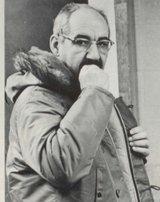More classroom tales. Continue reading
All sophomores at Rockhurst took the same classes with the others in their homerooms. The subjects were pretty much the same as in freshman year: English, Latin, math (geometry), American History, and religion. We did not take typing. The sophomores took typing when we were freshmen, and the freshmen took typing when we were sophomores.
I remember almost nothing about the religion classes. Of this much I am pretty certain: Church history (a subject that has subsequently fascinated me endlessly) was never mentioned in religion classes or anywhere else.
Likewise, I remember very little about the sophomore and junior English classes. I don’t even remember who taught them. I recall that we watched a film about Macbeth that claimed that most people misinterpreted it. Unfortunately, I don’t remember the details.
 I vividly remember that as part of English class we spent a few days in a speed-reading course. It taught a technique of maintaining focus in the middle of the page while picking up the right and left with peripheral vision. We had exercises in which we read a story and then took a ten-question multiple-choice test with no penalty for guessing. We then were given a score of our speed-comprehension score, which was our words per minute times the percentage we got right.
I vividly remember that as part of English class we spent a few days in a speed-reading course. It taught a technique of maintaining focus in the middle of the page while picking up the right and left with peripheral vision. We had exercises in which we read a story and then took a ten-question multiple-choice test with no penalty for guessing. We then were given a score of our speed-comprehension score, which was our words per minute times the percentage we got right.
It did not take me long to figure out how to game this. I usually knew one or two of the answers before reading the story. So, I decided to maximize my speed. I read the story in less than ten seconds. Okay, I didn’t “read the story” but I did glance at every page. On the test I got five or six out of the ten questions right. My speed-comprehension score was completely off the chart, 50,000 or 100,000 words per minute. If I had made the denominator one second, it would have been nine times higher. I think that the school dropped this exercise after this experiment.
 The sophomore Latin teacher was Mr. Stehno (STEE no), a layman.
The sophomore Latin teacher was Mr. Stehno (STEE no), a layman.1 We studied Caesar’s self-serving account of his conquest of Gaul. Like all of the other teachers at Rockhurst Mr. Stehno favored the Church Latin pronunciations; “Veni, vidi, vici” was pronounce VAY nee, VEE dee, VEE chee, not WAY nee, WEE dee, WEE kee.
Classroom high jinks were very rare at Rockhurst. Most of the teachers were on the alert for mischief, and there were no warnings issued. Every misdeed merited, at the least, a demerit.
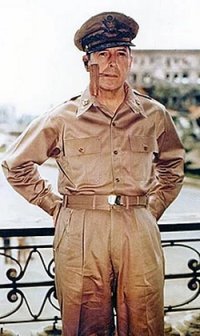 Mr. Stehno was one of the few teachers who taught from the desk. Now and then he would stand up to write something on the board, but for the most part he stayed seated. One day Vic Panus bet someone, maybe Pat Tierney or Mike Van Dyke, that he could do a forward roll in the aisle between his desk and the last row without being caught. He definitely pulled it off. I had a ringside seat.
Mr. Stehno was one of the few teachers who taught from the desk. Now and then he would stand up to write something on the board, but for the most part he stayed seated. One day Vic Panus bet someone, maybe Pat Tierney or Mike Van Dyke, that he could do a forward roll in the aisle between his desk and the last row without being caught. He definitely pulled it off. I had a ringside seat.
Mr. Stehno loved generals, especially Julius Caesar and Douglas MacArthur. He thought that President Truman’s recall of MacArthur in the Korean War was the lowest point in the history of mankind since the infamous Ides of March.
Mr. Stehno also supervised the chess club, in which I participated for a year or two.
 There was absolutely no nonsense in Mr. Ryan’s classes. He walked up and down the aisles while he taught us American history. He was obviously very much into World War II. We spent what seemed to me an inordinate amount of time on the American involvement in the European campaign, especially the Battle of the Bulge.
There was absolutely no nonsense in Mr. Ryan’s classes. He walked up and down the aisles while he taught us American history. He was obviously very much into World War II. We spent what seemed to me an inordinate amount of time on the American involvement in the European campaign, especially the Battle of the Bulge.
I have never found American history very interesting. Once you know about our “original sin” of slavery, everything else pretty much seems (to me, at least) to fall into place.
The subject matter in the sophomore math class was geometry, taught by Mr. Petersen, another layman, who, for whatever reason always wore a white lab coat.2 He was a pretty good teacher, but what I liked best was that he let us work ahead if we wanted to in order to finish the class in one semester. I took advantage of this. I actually did all the problems and, along with a handful of other guys, passed the final exam before Christmas.
Finishing geometry early allowed us to take probability in the second semester with a group of seniors. I really liked the probability class. It was interesting for us sophomores. The rest of the class was older than any of us, but academically they were no match for us. The pace of the class was a little slower than what we were used to.
In junior year there were some electives. English, Latin, math (trigonometry and other functions taught by Mr. Petersen), and religion were still required, but we could pick French or Greek for the second language. The other choice was between chemistry and modern European history. Most guys in our class chose French and chemistry, but I picked the other two.
Did you notice? Biology was not even offered at Rockhurst. When I told this to people at the University of Michigan, they could not believe it.
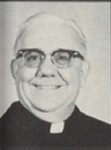 The junior Latin class was taught by the legendary Fr. Mario Puricelli, SJ. The text that we were asked to learn was from one of Cicero’s orations. Someone would be called up to the front of the class to translate a few sentences. The victim’s rendition was expected to be perfect, and that meant perfect according to Fr. Puricelli’s standards. For example, his translation of “O tempora, o mores” was “Ye gods and fiddlefish.”
The junior Latin class was taught by the legendary Fr. Mario Puricelli, SJ. The text that we were asked to learn was from one of Cicero’s orations. Someone would be called up to the front of the class to translate a few sentences. The victim’s rendition was expected to be perfect, and that meant perfect according to Fr. Puricelli’s standards. For example, his translation of “O tempora, o mores” was “Ye gods and fiddlefish.”
I wasn’t crazy about his methods, but no education at Rockhurst in that (very long) era would be complete without at least one class from “Father Purch”. And he definitely did know his Latin.
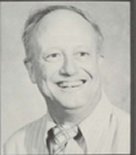 I liked Mr. Stark’s Modern European History class better than the World History Class he taught to freshmen. He still was as insistent on the six items that everyone must have available: pencil, pen, eraser, assignment book, folder, paper. His best technique was to emphasize certain dates that could serve as anchors for remembering the associated facts. The most obvious one was “1066: Battle of Hastings; William the Conqueror.”
I liked Mr. Stark’s Modern European History class better than the World History Class he taught to freshmen. He still was as insistent on the six items that everyone must have available: pencil, pen, eraser, assignment book, folder, paper. His best technique was to emphasize certain dates that could serve as anchors for remembering the associated facts. The most obvious one was “1066: Battle of Hastings; William the Conqueror.”
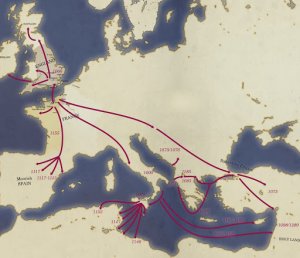 In this case, however, I think that he should have provided a little more context. William was, of course, a Norman, which meant very little to me. When, much later, I discovered that the Normans did not just invade England. Their influence extended to Sicily, Italy, Kiev, and eventually Spain, Antioch, and Jerusalem. Moreover, one or two generations earlier they had been pagans living in Denmark.
In this case, however, I think that he should have provided a little more context. William was, of course, a Norman, which meant very little to me. When, much later, I discovered that the Normans did not just invade England. Their influence extended to Sicily, Italy, Kiev, and eventually Spain, Antioch, and Jerusalem. Moreover, one or two generations earlier they had been pagans living in Denmark.
I remember three of the seniors in that class. A guy named Tamaio sat a few seats ahead of me. He had much more difficulty than anyone else. Two football players named Briscoe and Donaldson were constantly making mischief on the other side of the room. During a test Mr. Stark walked around the room a few times. On the last occasion he confronted Briscoe with the fact that his textbook was lying open on the floor next to him. Briscoe said that it must have fallen out of his desk.
“Then please explain why it was open to a different page the last time that I came by?” Mr. Stark asked.
Briscoe, of course, blamed the wind. In the end, Mr. Stark gave Briscoe the choice of a punch or a jug. Briscoe chose the former, and Mr. Stark delivered a more formidable blow on Briscoe’s upper arm than I would have thought him capable.
Greek was taught by Fr. Burton, SJ. He was old then; my research has thus far failed to pinpoint what became of him. This class was, for me, a real delight. I loved learning the new alphabet, and I loved reading Homer’s stories in the original.
More than any of my other teachers Fr. Burton took a dim view of my attendance at speech events that caused me to miss some of his classes.
 Mr. Hill, one of the coaches, proctored our study hall in my sophomore year. The only reason that I mention this is that it fell to him to announce to the guys in our class on Friday, November 22, 1963, that President Kennedy had been shot in Dallas.
Mr. Hill, one of the coaches, proctored our study hall in my sophomore year. The only reason that I mention this is that it fell to him to announce to the guys in our class on Friday, November 22, 1963, that President Kennedy had been shot in Dallas.
1. Joseph Stehno died in 1999. His obituary is here.
2. Harold Petersen died in 2006. His obituary is here.

